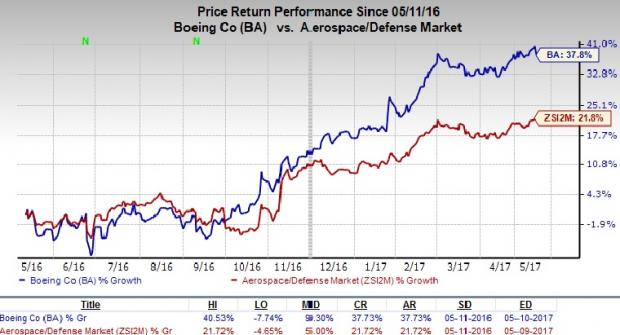Leading commercial aircraft maker The Boeing Company (NYSE:BA) is temporarily suspending test flights of its new models of commercial jetliners 737 Max due to probable problems with a key engine part, according to media sources. The step is intended to focus on the safety of all who use and fly the company’s products.
Following this news release, Boeing’s share price slipped 1.3% yesterday to $183.18.
Reason Behind the Suspension
CFM International – a 50/50 joint venture between General Electric Co. (NYSE:GE) and Safran (PA:SAF) of France, and maker of the new engine model – recently reported a potential manufacturing quality flaw in the CFM LEAP 1B engine that powers the new-generation jet. Soon after that, Boeing suspended the flights "out of an abundance of caution" and is currently inspecting along with CFM to find out the root of the problem.
According to Jamie Jewell, spokeswoman for CFM, the glitch spotted in Leap 1B is in the low-pressure turbine discs and only in those manufactured by a specific supplier. Incidentally, the company obtains the discs from two different suppliers and the problem had not been detected in the discs provided by the other supplier.
She added that although no complication was identified during months of flight testing of the engines, the jets will be recalled and modified. The affected engines will be sent back to the manufacturing sites in Indiana and France from Washington for inspection to determine the number of affected jets.
Despite this suspension, both Boeing and CFM said that this is a temporary and cautionary measure. The delivery of the first 737 Max-8 remains on schedule for later this month.
Impact of the Decision
Many analysts are of the view that if the problem is quality related and not a design issue then it will not have much impact on the company’s financials. However, if the problem is more complex and time-taking to resolve than expected, then Boeing might have to replace 737 Max deliveries by ramping up production of the existing generation single-aisle, 737 Next Generation. Consequently, this would mean selling of additional 737 NGs at below-average prices and in turn might hamper Boeing’s growth trajectory.
A Brief Note on 737 Max
Boeing’s 737 MAX family of commercial aircraft incorporates the latest-technology CFM International LEAP-1B engines to deliver the highest efficiency, reliability and passenger comfort in the single-aisle market. In particular, these jets boast a 40% smaller noise footprint than today's single-aisle airplanes.
With over 3,700 orders already placed in the MAX family, Boeing says that MAX 9, compared with its prior version, the MAX 8, has been designed for better fuel efficiency at reduced costs.
The 737 series is most used for short to medium duration flights and competes with Airbus Group (PA:AIR) SE’s (OTC:EADSY) A321neo. Airbus has an upper hand in this class of jet performance as its A321neo seats more passengers and flies a farther distance than the MAX 9. With orders of 3,600 MAX jets in place, only 220 have been the MAX 9, keeping the industry leaders doubtful.
Single-Aisle Aircraft in Demand
Over the next 20 years, Boeing envisions demand for over 39,620 commercial airplanes, valued at more than $5.9 trillion. About 38% of the total commercial demand is likely to come from the Asian markets. Single-aisle airplanes will comprise nearly 70.6% of the new deliveries, with airlines requiring over 28,140 jets of this category.
According to the company, India will need 1,850 new planes worth $265 billion in the next two decades, up 6% from the year-ago estimate. Boeing expects single-aisle jets to be the major driver of demand growth, comprising 71% of this total projection. Albeit the new line of 737 MAX 8 and 737-800 will likely grab a lion’s share of the new orders, Airbus’ A320neo is expected to pose a significant competitive challenge.
Boeing’s 737 is one of the best-selling planes in the single-aisle market, thanks primarily to its fuel efficiency and passenger comfort. To maintain its dominance in the commercial aerospace market, the company continues to invest in research and development to churn out upgraded versions of its existing planes.
Price Movement
Shares of Boeing have increased 37.7% over the last 12 months, outperforming the Zacks categorized Aerospace–Defense industry’s gain of 21.7%. This could be because the company’s strong balance sheet and cash flows provide financial flexibility in matters of incremental dividend, ongoing share repurchases as well as earnings accretive acquisitions. The stock’s performance is in line with that of General Dynamics Corp. (NYSE:GD) , which also surpassed the industry mark.

Zacks Rank
Boeing currently carries a Zacks Rank #3 (Hold). You can see the complete list of today’s Zacks #1 Rank (Strong Buy) stocks here.
The Best & Worst of Zacks
Today you are invited to download the full, up-to-the-minute list of 220 Zacks Rank #1 "Strong Buys" free of charge. From 1988 through 2015 this list has averaged a stellar gain of +25% per year. Plus, you may download 220 Zacks Rank #5 "Strong Sells." Even though this list holds many stocks that seem to be solid, it has historically performed 6X worse than the market. See these critical buys and sells free >>
Boeing Company (The) (BA): Free Stock Analysis Report
General Dynamics Corporation (GD): Free Stock Analysis Report
Airbus Group (EADSY): Free Stock Analysis Report
General Electric Company (GE): Free Stock Analysis Report
Original post
Zacks Investment Research
